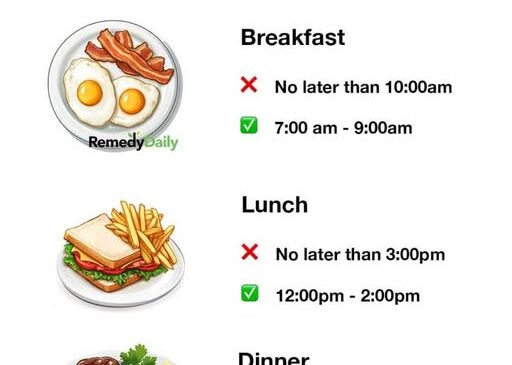Introduction
Eating is a daily act that fuels the body, yet the timing of meals plays a crucial role in digestion, energy balance, metabolism, and overall health. Many people eat too late at night, skip breakfast, or snack inconsistently, which can affect sleep, weight, blood sugar, and comfort. Learning the right time to eat helps the body work synchronously with its natural rhythm, promoting physical and mental well-being.
Origin
The concept of “timed eating” can be traced back to ancient civilizations.
- Ayurveda (India): Encouraged eating the biggest meal when digestion is strongest—midday.
- Traditional Chinese Medicine: Linked meal timing to organ cycles, emphasizing harmony with nature.
As modern research progressed, studies on circadian rhythm supported these ancient teachings, demonstrating that metabolism functions best when food intake aligns with daylight hours.
Cultural Significance
Cultures worldwide have distinct eating patterns shaped by lifestyle, climate, and tradition.
- Mediterranean societies enjoy leisurely lunches in early afternoon.
- Asian cultures emphasize regular meal timing to support digestive fire (“agni”).
- Some cultures fast daily during certain hours for spiritual or health benefits.
The growing popularity of intermittent fasting shows a modern return to structured eating, reinforcing the belief that “when we eat” matters as much as “what we eat.”
Ingredients & Quantity
(These are suggested items to support ideal eating times—flexible based on needs)
| Ingredient (Meal Example) | Quantity |
|---|---|
| Balanced breakfast: protein + whole grains + fruit | 1 plate |
| Lunch: vegetables + carbs + protein | 1 plate |
| Light dinner: veggies + lean protein | 1 small plate |
| Water | 6–8 cups/day |
| Healthy snacks: nuts/fruit/yogurt | 1 small handful or serving |
Optional Additions
- Herbal teas (ginger, mint) to support digestion
- Probiotic-rich foods (yogurt, kefir, pickles)
- Smoothies or soups for gentle meals
- Healthy fats (olive oil, avocado)
Tips for Success
- Eat your first meal within 1–3 hours after waking
- Make lunch your biggest meal
- Avoid heavy meals 2–3 hours before sleep
- Hydrate consistently throughout the day
- Listen to hunger and fullness cues
- If snacking, choose fiber + protein options
- Maintain consistent daily timing
Instructions
(Recommended daily timing plan)
- Breakfast — 7–9 AM
Break your fast early to boost metabolism and energy. - Lunch — 12–2 PM
Make this the largest and most nutritious meal. - Optional Snack — 3–4 PM
Choose something light and balanced. - Dinner — 6–8 PM
Keep it simple and light; avoid late-night meals. - No eating 2–3 hours before bed.
This supports digestion and reduces nighttime discomfort.
Description
Eating according to the body’s internal clock—circadian rhythm—supports better digestion, balanced hormones, and steady energy. Research suggests that the body processes nutrients more efficiently during the day when metabolism is naturally elevated. Late-night eating can contribute to poor sleep, indigestion, and weight gain. Aligning mealtimes with daylight hours helps regulate blood sugar, mood, and metabolism.
Nutritional Information
(Key principles rather than numbers)
- Daytime eating supports glucose control
- Morning calories provide energy for the day
- Balanced intake of protein, whole grains, and vegetables improves satiety
- Moderating nighttime food supports metabolic health
- Hydration promotes digestion and nutrient transport
Conclusion
The right time to eat is guided by your body’s natural rhythms. Earlier, consistent meals give your body what it needs to function well, while late-night eating often works against digestion and sleep. With mindful timing—breakfast in the morning, the largest meal midday, lighter dinner—you support long-term health and energy.
Recommendation
- Eat at regular times each day
- Prioritize a wholesome breakfast and lunch
- Keep dinner light and early
- Avoid going to bed on a full stomach
- Stay hydrated
If health concerns exist (diabetes, pregnancy, medical conditions), consult a healthcare professional to tailor timing to your needs.
Embracing Healthful Indulgence
Eating with intention is an act of self-respect. Let your meals become moments of nourishment—slow, unhurried, and timed with your body’s rhythm. Savor warm breakfasts, balanced lunches, and calm early dinners. Treat each meal as a chance to support your well-being and honor your body’s natural cycles. Truly, mindful eating is a small indulgence that yields lasting rewards.
